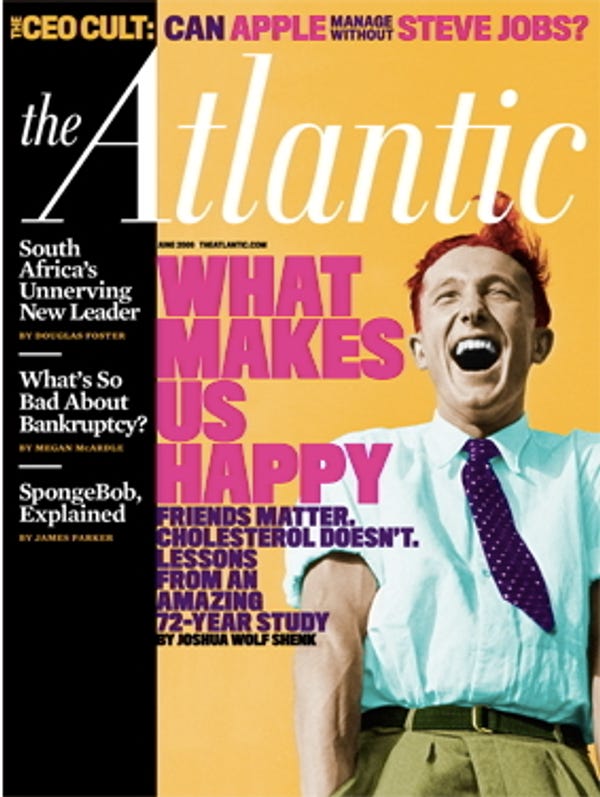The Atlantic Makes Us Happy On Several Levels Today
Sup friends? Welcome to Thursdays, welcome to magazines, etc. Today it's INTERN'S CHOICE, as it is your Intern Juli's last day here at Wonkette (for the time being??)—and of course, with respect to our current understandings of the terms "Intern", "Juli" and "Wonkette." Cliff-hanger!
Anyway: back to the Atlantic , which is your Intern's Choice, because they've published another one of their famous Let's Do Something Zeitgeisty! Issues. And the centrifugal force powering our round table today? Happiness.
"What Makes Us Happy": According to Liz Phair, US Poet Laureate (1993-1994), what makes you happy is"all that matters." According to this 72 year long longitudinal study at Harvard—the Liz Phair of graduate-level psychology programs—it's actually more about how you respond to things as opposed to the terrible, terrible things that inevitably happens to you. (Passive voice here, to make a meta-point!) Harvard selected 268 men, who matriculated during the 30s, and traced the way they responded to things—or "adapted"—during the last 72 years. So let's skip all this and get to the Secrets To Happiness, which are (spoiler alert!) as follows: "Employing mature adaptations, education, stable marriage, not smoking, not abusing alcohol, some exercise, and healthy weight." Which, hm, funsy. [What Makes Us Happy ]
"Do CEOs Matter?": Ah, here's one right out of theSlate playbook. Hmm, we're going to guess—counter-intuitively!—that no, they do not. Because you think CEOs totally do matter, right, so of course they do not. Using ultra-modern economic and sociological theory , the Atlantic takes the case of Steve Jobs as a prism through which to argue that while yes, CEOs are important in terms of shareholder confidence, they actually don't matter all that much, in the long run. Let's look at the evidence: even with popular CEOs, like Jack Welch, it's not like the company didn't come into being when Welch took over. So true! Oh and also, other stuff that the Atlantic calls "industry effects"—for instance, the, um, market's available capital—count for more. [ Do CEOs Matter? ]
"American Sushi": Oh okay, and since theAtlantic was your Intern's choice, here is a "reader's choice" because everyone likes to talk about capital-F Food in the context of sustainable development now, yes? That is a thing? So let's hear all about trends in sushi: Japanese chefs in America have long tended to assume that Americans A. are not adventerous eaters and B. don't particularly care about their health or sustainable development. But still, recently, American chefs in Japanese restaurants have started to do things like not serve certain fish because they are some of the endangered ones. Also, chefs have started offering more traditional fishes because Jesus Christ, it's enough with the tuna. [ American Sushi ]


